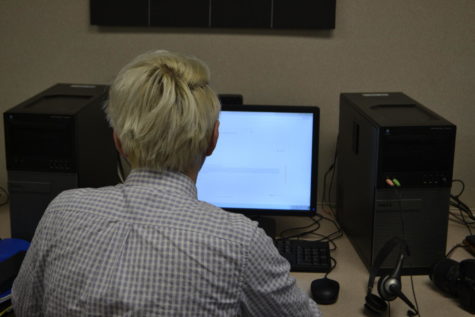Online Classes: The New Frontier?
Virtual education offers up its positives as well as its negatives
October 6, 2017

As society makes its way into the era of new technology, the way students learn is evolving.
Within the last decade, the amount of classes being offered online has grown exponentially. But, the same question remains: are these virtual classes really as effective as the traditional face-to-face model?
“It was the content that made the class hard for me, not the structure,” Nathan Toon, an RV senior, said about his online class experience. “I wasn’t really into the subject so I didn’t really apply myself. I didn’t do very well.”
So, is it in the subjects and not the concept of online classes where the problem lies?
The New York Times begs to differ. In an article about the drawbacks of online college courses, the paper claims that “courses delivered solely online may be fine for highly skilled, highly motivated people, but they are inappropriate for struggling students who make up a significant portion of college enrollment and who need close contact with instructors to succeed.”
The truth is many students need a physical push in order to complete their work effectively and efficiently.
“The research has shown over and over again that community college students who enroll in online courses are significantly more likely to fail or withdraw than those in traditional classes,” The New York Times states, “which means that they spend hard-earned tuition dollars and get nothing in return.”
Drive is a necessary component for being able to successfully learn from online classes, and the truth is that many of the students opting for online classes do not have this characteristic.
The fact that colleges offer online classes feeds their financial institution, because as students fail online classes they must take – and pay for — another class to make up for it.
For this reason, many colleges are not structuring their classes in a way that leads students to success without requiring intense dedication.
Many students go into college or online classes without knowing what to expect.
According to Montgomery College, “An Internet-based course demands that you develop personal time-management skills. As with most things, if you don’t manage your time properly, you will find yourself buried beneath a seeming insurmountable mountain of coursework.”
Time management is not a skill that is easy for students to manifest; it is a skill that requires time to develop and master.

But, if students are not being informed of this issue, how can they know whether or not they should take the class?
Often times, because students are not equipped with this information, they become overwhelmed by their classes and may even give up on them. In a real classroom, teachers may be able to offer guidance or will try to push a student in the right direction.
In the traditional models of classes, students are kept to a schedule through reminders from the teacher, and while some time management skill is necessary, students are mostly closely managed by the teachers.
But, once a student takes an online course, all of the responsibility and time management is transferred to the student—who is often unprepared.
However, with online courses, there is no way the instructor can know how a student is struggling if they cannot communicate effectively.
One of the more pressing problems with online classes is that students cannot as easily ask for the type of immediate assistance they can garner in a traditional classroom setting.
Online students cannot raise their hands during a lecture and ask a teacher for clarification. But, one benefit is that most of the learning in online classes is down through reading text, which can allow a student to reread the content of the class when they do not retain the information.
But if a student misinterprets content and this interpretation does not get corrected, then the possibility of the student of doing something wrong increases.
If the learning is incorrect, what is the point of taking the class anyway?
Within traditional classes, students’ work is checked by a teacher, and they can receive feedback and assistance for what they are doing wrong.
This is not necessarily the case for online classes.
Another problem about the rising reliance of online classes is the amount of people who will be able to access it. Students who cannot afford a computer or do not have an internet connection may find themselves left out.
While this may seem like a far-fetched issue, there are a surprising amount of Americans who do not have access to the internet. According to a 2013 survey, 15% of students do not have access to this sort of education.
Now, because of this internet “gap”, an educational divide is established between those who can afford an online education and those students who are out of luck.
In turn, this educational divide contributes to the already widening gap between the wealthy and working class, which in turn leads to increased social tension and violence.
While this downward spiral may seem like a stretch, education is one of the most important contributors to an individual’s financial success.
One upside to taking an online course is it does not affect how colleges view your application.
“Colleges generally don’t differentiate between online high schools and traditional high schools,” said the staff of Sterling Academy, a private online school. “Most admissions requirements are the same regardless of the type of school: credit hours for math, science, languages, and electives.”
So, if you are a student who has taken online classes, your admission into college will not be affected by this aspect, which allows students to take unique and more classes than they may be able to at a traditional school.

Felicia Hamilton, an admissions counselor for the University of Colorado at Boulder remarks, “As an admissions counselor, as long as an online course demonstrates sufficient rigor and is provided through an accredited institution, we do not see them any differently than we would a regular class. Of course, this may not be the case for other universities!”
So, while online classes may look good on a student’s transcripts, the learning may not actually be there.
“Personally, though I see the benefit of online classes—especially in the case of extenuating circumstances—I believe that classes taken in person are far more enriching and that the class environment is beneficial to retention! This has always been my personal experience, since I did take a few online courses during high school, and I found them neither as enjoyable nor as memorable as live classes,” Felicia states her personal opinion.
One of the components of a traditional class that makes it a stable learning environment is the ability students have to participate in their own learning. They are able to do hands-on activities with the guidance of a teacher, while those taking online classes are limited to their screen.
“I liked the self-paced nature of the classes,” said Isaac Hoskins, a student at Wheat Ridge High School, “but the intensity and learning of the classes wasn’t very good. But it’s easy to get more classes that way.”
Hoskins was successful in his online classes because of his dedication to learning, but he believed that he did not learn as much through these courses, but he liked that he was able to take more classes each semester than is traditionally allowed.

Online classes can be a useful tool when a student is very driven and wants to go out of their way to learn. But, the structure and limited difficulty of these classes cannot surpass the amount of support given within a traditional classroom.

